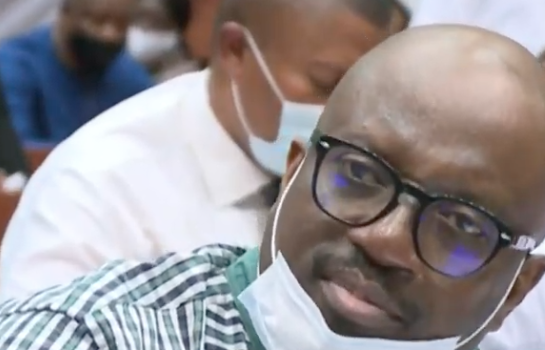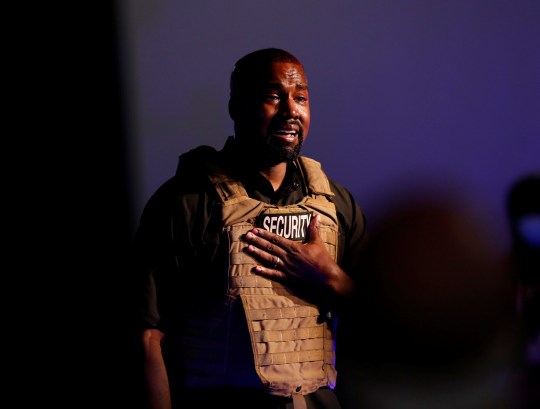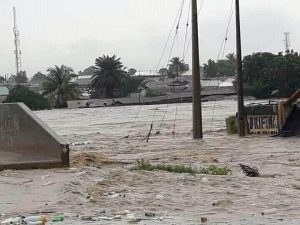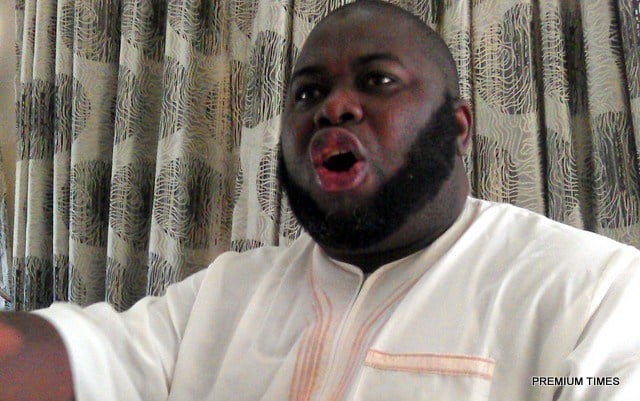Why is Nigeria like this? Don’t look too far: the answers are well articulated in the Niger Delta Development Commission (NDDC) saga. I would say NDDC is a microcosm of Nigeria. If you understand the genesis of NDDC, as well as the latest revelations, you do not need to stretch too much to understand why Nigeria is perpetually moving towards the apocalypse — at full speed. The worst mistake you would make is to look at the NDDC scandals, snigger and conclude that the people of Niger Delta have underdeveloped their own region. That would be a poor reading and a misjudgement of the currents and undercurrents of the spectacle unfolding before our very eyes.
Where do we start from? Let’s take it from the beginning. Many believe the establishment of NDDC in June 2000 by President Olusegun Obasanjo was absolutely unnecessary. The late Oronto Douglas, a Niger Delta youth leader at the time, said all that was needed to develop the oil-producing region was political will, not some gigantic commission. He said no special agency was set up to develop Abuja, that various administrations were just determined to develop the city and, in no time, roads, bridges, edifices, water and electricity showed up everywhere. Actually, the Federal Capital Development Agency (FCDA) was set up for this purpose, but we will come back to that shortly.
In a sense, there was a political case for the creation of NDDC. The region from where Nigeria mines its livelihood had suffered neglect and injustice for decades, so it made sense for the federal government to seek to make it up to the Niger Delta through a special interventionist programme. While I understood Douglas’ position very well — that is, the federal government could still build infrastructure in the region without setting up the NDDC — the situation required good optics, especially as restiveness was on the rise. The problem, however, is that NDDC was born in sleaze. It instantly became a cesspool of decay. The concept is cool but the delivery is disastrous.
Last year, President Muhammadu Buhari appointed an interim management committee (IMC) to oversee the commission pending the completion of a forensic audit. The first IMC fell apart as politicians dug deep. Buhari brought in a new acting MD. As we were busy waiting for the forensic audit, the interim managers were busy burning money. Give it to them: they know how to blow billions. Nobody believes anybody will be punished for financial recklessness. Thus, as one MD steps out, another steps in and continues the rot — probe or no probe, audit or not audit. That is typical of Nigeria, where a head is removed for corruption and the successor steals even more.
Advertisement
Professor Kemebradikumo Pondei, the acting NDDC MD, said with his own mouth before the senate panel probing the IMC that the commission spent N1.5 billion as COVID-19 relief for staff. He said, and I quote with due respect, that “we took care of ourselves”. That is Nigeria in a nutshell. When some people get into government positions, they first take care of themselves — professor or no professor, pastor or no pastor. When they are appointed or elected, they are eagerly looking out for the initial bank alert. Then they begin to search for where the real money is so that they can “take care” of themselves. It is not just in NDDC. It is a public office culture in Nigeria.
Pondei is a professor. Again, in Nigeria, it doesn’t matter whether you are a professor or an illiterate — we almost always get the same results from our leaders. Observe the state houses of assembly, state cabinets and agencies, federal bodies, federal cabinet, national assembly and civil service. You will see PhD holders and those with little or no education. Their behaviours and conducts are quite similar in most cases: grub, grab and gulp. They could be economists, accountants, medical doctors, journalists, engineers, whatever. The attitude to the treasury is alike. Some want us to believe that it is paper qualification alone that will transform Nigeria. I can’t find the evidence yet.
Pondei pulled off a perfect Nollywood stunt at the house of reps hearing on Wednesday by fainting. I used the phrase “perfect Nollywood stunt” on purpose — because it is only in Nollywood that somebody will faint and will still be moving his hands. It is African magic. If you don’t believe it is Nollywood, why did the speaker, Rt Hon Femi Gbajabiamila, say Pondei would no longer testify and that his written testimony would suffice? If I was the one that wrote the script, I would have followed a similar story line: faint and you won’t have to answer any more questions; I will let you off the hook and protect you from being subjected to serious questioning. It is a simple trick.
Advertisement
“Is okay, off the mic, is okay.” That is another trick. When Senator Godswill Akpabio, the minister of Niger Delta, revealed that NDDC contracts were given to federal legislators, the chairman of the probe panel practically begged him not to spill the tea. Well, it is not just NDDC contracts, so don’t make it look like a Niger Delta problem. Check agencies that award mega contracts and you will see companies nominated by lawmakers cornering almost everything. They see it as their birthright. That is their definition of “oversight” function. By the way, I hope I have not been misunderstood: I am not referring to the current federal lawmakers. Those ones are super clean. LOL.
Dr Cairo Ojougboh, NDDC’s director of projects, said getting the commission’s contract was like winning the lottery: N70 million would do a job awarded for N700 million. Again, this is not an NDDC problem; it is a Nigerian problem. Do you know how much the road contracts in your state are awarded for? While we are at it, have we imagined what goes on in the Ondo State Oil Producing Areas Development Commission (OSOPADEC), the Delta State Oil Producing Area Development Commission (DESOPADEC), the Akwa Ibom State Oil Minerals Producing Areas Development Commission (AKWAPADEC), and the other mini-NDDCs? “Is okay, off the mic, is okay.”
Now, what is my point? The shenanigans in the NDDC, as unfortunate and depressing as they are, should not be viewed from the narrow perspective of a Niger Delta problem alone. I know it will help the argument that “these people are their own problem” but we will be missing the bigger picture. Financial rascality is endemic in government institutions — north or south, east or west, federal or state. The levers of accountability are too low. In theory, we have solid checks and balances in place: the procurement processes are tight, auditors vet the books and legislators do the oversight. If they all do their jobs patriotically and professionally, the Nigerian story will definitely read differently.
But, in reality, government offices are filled mainly with gold diggers and buccaneers. Collusion is the operating principle. All the people that could conspire to subvert the processes gladly do so, and the money is snatched and shared. It is daylight robbery disguised as fraud. Most times, it is the failure to “shake body” that leads to probes, not a sincere desire to clean up the system. And as we can see with the NDDC, the elite cannot be bothered with the state of the nation. Nigeria is not like this — upside down — by mistake. The elite conspiracy is real and lethal. As we weep for the Niger Delta, we should note that the NDDC is just a metaphor that explains Nigeria’s overall underdevelopment.
Advertisement
I conclude. What should we do with the NDDC? The commission has collected over a trillion naira in budgetary allocations over the years but can we say with every sense of responsibility that it has delivered value for money? It has not only been wracked with scandals for a long time, it is also difficult to point to any significant difference it has made in the region in 20 years of its existence, apart from being a slush fund for politicians and their associates — to finance their egos and libidos. There is no denying that the NDDC has missed the road. There is no kinder way of saying this. Only those who have feasted fat on the commission can claim all is well as things stand.
What next? The shortcut is to dissolve it. But that means so many bodies and agencies will have to be dissolved in Nigeria if we apply the NDDC as the benchmark. An option is to restore the commission to its factory settings and restart on a clean slate. It is very important to bring those found wanting to book. If there is crime, there should be punishment and it must be applied. The commission is due for a roots-and-branch review and reform. It has clearly derailed, and this is not because of the usual excuse of not having enough money. A proper diagnosis is needed, followed by appropriate prescription and treatment. Whatever we decide, something has to give.
AND FOUR OTHER THINGS…
FAREWELL, FUNTUA
Alhaji Ismaila Isa Funtua’s death has robbed me of a very valuable critic. For over 13 years, we regularly exchanged banters over my articles. Anytime I got his call, I would joke: “Alhaji, am I in some form of trouble again?” Witty and frank, he had a very engaging personality. Whenever I visited him, I spent at least two hours because there was always something to argue about — and I always learnt a thing or two from his life journey. So many things have been said about his business dealings. I don’t know much about that. We discussed only politics and journalism (he was a newspaper publisher). His death was sudden, but at 78, he surely didn’t die young. Adieu.
Advertisement
THE AZURA BURDEN
I am not a fan of probes by the national assembly — from experience, there is always more to it than the quest for accountability. Truly, I don’t know how many probes have yielded meaningful outcomes since 1999. Nevertheless, we should be happy that the senate has resolved to probe Nigeria’s take-or-pay deals with Azura Power and Accugas Ltd. These deals are killing our treasury. I will continue to say that Azura and Accugas did no wrong — you cannot begrudge them for winning the lottery. Those who have a case to answer are the Nigerian officials who foisted these deals on us despite knowing very well that we would not have the capacity to enjoy the full benefits. Wicked.
Advertisement
DOUBLE JEOPARDY
In your quiet moment, please spare a thought for Chief Agboola Ajayi, the deputy governor of Ondo state. He had defected from the All Progressives Congress (APC) to vie for the governorship ticket of the Peoples Democratic Party (PDP) ahead of the October 10 poll — only to be defeated by Mr Eyitayo Jegede. But in life, there is always something to be grateful for. Attempts to remove him as deputy governor after his defection failed. If not, Ajayi would also have become a former deputy governor by now. Jegede will now square off with Governor Rotimi Akeredolu, the APC candidate, who defeated him in 2016. The Ondo election promises to be interesting. Loading…
Advertisement
INTEGRITY MATTERS
I often say that those who lack integrity are often the loudest and harshest in attacking other people’s integrity. As it has turned out, Derek Chauvin, the racist American police officer who murdered George Floyd for allegedly spending a fake $20 bill, is going to face another charge: underreporting his joint income with his divorce-seeking wife by $464,433 from 2014 to 2019. They reportedly cheated the Minnesota state by nearly $38,000. So in addition to the charge of second-degree murder over a $20 bill, he will face multiple felony counts of tax evasion. He allegedly made the unreported income doing off-duty security work and weekend shifts at a restaurant. Poetic.
Advertisement
Add a comment







